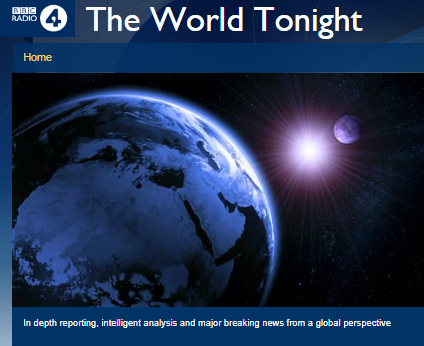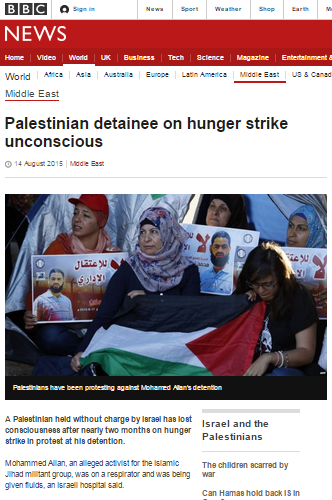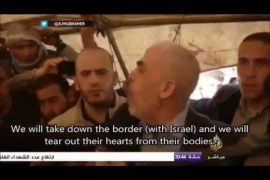In part one of this post we looked at the first half of an item aired in the June 25th edition of the BBC Radio 4 programme ‘The World Tonight’ – presented by Ritula Shah – concerning the economic workshop in Bahrain which had commenced that morning.
Following a report from Yolande Knell which included a statement from the Palestinian Authority prime minister, Shah went on (from 24:37 here) to introduce an interviewee. That interview is notable because for the first time in the six days that the BBC had been covering the story (see ‘related articles’ below), audiences heard an alternative view of the topic.
[emphasis in italics in the original, emphasis in bold added]
Shah began by quoting unnamed ‘critics’.
Shah: “Well critics of the plan say it’s little more than a remix of early attempts to resolve the Israeli-Palestinian conflict and they claim the document includes photos of Palestinians involved in aid programmes that have been cut by the Trump administration. Jon Lerner is a senior fellow at the Hudson Institute and served as a deputy to the UN ambassador Nikki Haley [US ambassador to the UN – Ed.]. I put it to him that people have criticised the absence of any discussion of political issues such as Israeli settlement building or prospects for Palestinian statehood. So why didn’t he see that as a problem?
Lerner: “It’s not an obstacle because that portion of it is still to come. This is a phased plan where the initial phase is to discuss the economic aspects of it and the political aspects that they’re referring to will be outlined at a later date. The administration felt that outlining the rewards or the benefits of peace might be helpful in concentrating everybody’s minds.”
Once more Shah took to paraphrasing the supposed arguments of unidentified commentators.
Shah: “But there are those who would argue that some indication of the political decision-making of the Trump administration might already have been indicated by the decision to move the embassy to Jerusalem, which sends a very clear signal to the Palestinians, some might argue. So there have been hints of the direction of travel which perhaps are not fair, perhaps are one-sided, but yet Palestinians are left with the view that perhaps their views are being under-represented.”
Lerner: “Yes, well that’s where the Trump administration has parted with previous efforts and I think has done so quite intelligently. They’ve taken certain questions like the question of whether Jerusalem will be the capital of Israel – a question that, you know, any serious person already knows the answer to – and they’ve said we’re going to exercise our judgement on that and recognise the reality that that is not a subject of future negotiations. There is no conceivable peace plan under which Jerusalem would cease to be the capital of Israel and so by merely recognising that reality, that does not pre-judge any of the more difficult questions…”
Interrupting her guest, yet again Shah used the ‘many people’ tactic without clarifying their identities.
Shah [interrupts]: “But that…many people would say that if you think back to the peace talks of the 1990s and the question of Jerusalem was left to be decided later because for many Palestinians that is a very important part of what they see as their future peace settlement and if you…”
Lerner: “Yes and we remember that same plan was unsuccessful and unagreed to. We should not look to the failures of the past as our guide for the future.”
Shah: “Do you think it might have built confidence with the Palestinian leadership, who are clearly very sceptical, have made no secret of their views of the Trump administration – do you think it would have helped to build confidence if perhaps there had been a mention of illegal settlements and so on: that those issues which are clearly important issues for the Palestinians – absolutely priority issues – had actually been front and centre of this plan?”
Lerner: “No I don’t. In fact the issue of settlements has been largely a distraction for a long time. It is certainly a topic that will be negotiated…”
An audibly irritated Shah once again interrupted her interviewee.
Shah [interrupts]: “Well is it a distraction if you…but is it a distraction if the ultimate goal is a two-state solution?”
Lerner: “The ultimate goal is peace. Whether it’s two states or one state or any number, any other formulation is to be determined. But by making the issue of settlements the dominant one in the discussion of the challenges facing the Middle East and facing the Palestinians, you actually take attention away from the more critical issues.”
Shah: “So just finally; we have yet to see this political road map or political plan that you talk about but should Palestinians in a sense still keep their hopes up that there could be a two-state solution under the Trump administration’s proposals?”
Lerner: “Absolutely. They should engage in it. They should continue to keep their hopes up because the goal of the Trump administration’s plans is to settle all of the disputes, have a peace agreement and improve the lives of both Palestinians and Israelis.”
Remarkably, Shah’s line of questioning throughout this whole interview mirrored the Palestinian Authority and PLO talking points complaining that the economic section of the plan does not include the political issues which – as had already been clarified – will be in its second part. Predictably, the only ‘political issue’ promoted twice by Shah was “illegal settlements” but she had nothing to say on relevant issues such as the Hamas-Fatah split or the fact that Hamas is not interested in a two-state solution or any other type of resolution of the conflict.
So while Radio 4 listeners did finally get to hear a different view of the Bahrain economic workshop in this interview, Shah nevertheless ensured that it avoided subjects far more relevant to the issue of the chances of resolving the Israeli-Palestinian conflict than ‘settlements’.
Related Articles:
BBC journalists get a ‘briefing’ from a past interviewee
BBC Radio 4 provides a platform for the PLO’s ‘apartheid’ smear
More PLO propaganda and polemic on BBC WS radio – part one
More PLO propaganda and polemic on BBC WS radio – part two
BBC widens its ‘illegal under international law’ mantra to include people
BBC radio ‘impartial’ on payments to terrorists
Another PA official gets unchallenging BBC radio air-time
More monochrome BBC WS radio reporting on the Bahrain workshop




